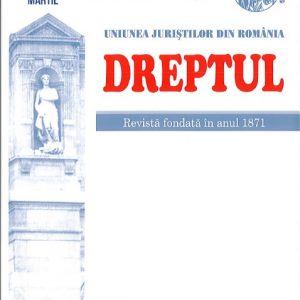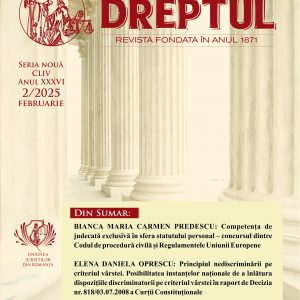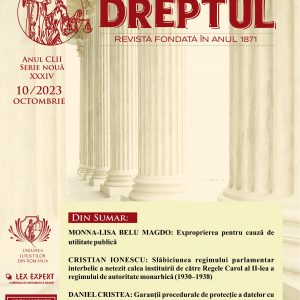-
 Sometimes, the deed provided by the penal law was perpetrated in the context of certain states, situations or specific circumstances, which grants it this legitimacy, and under these conditions, one removes one of the essential features of the crime, namely the unjustified nature. The category of the justification causes, which lead to the removal of the essential feature of the crime, consisting of the anti-lawfulness nature also includes the exercising of a right or the fulfilment of an obligation. In order to be deemed as justification, the perpetration of the penal deed must, usually, originate in a normative act, while the consequence of the perpetration of the penal deed must not be the consequence of the abusive exercising of that right. The author of the article shows that the fulfilling of an obligation removes the anti-lawful nature of the penal deed if the obligation is provided by the law, and if the deed is perpetrated within the limits regulated by it. The unjustified nature of the penal deed is removed, and the perpetrator acts so as to fulfil certain obligations imposed by the competent authority, on condition that the order or command is given by a legitimate authority, is mainly given in writing, and it must not be obviously illegal.
Sometimes, the deed provided by the penal law was perpetrated in the context of certain states, situations or specific circumstances, which grants it this legitimacy, and under these conditions, one removes one of the essential features of the crime, namely the unjustified nature. The category of the justification causes, which lead to the removal of the essential feature of the crime, consisting of the anti-lawfulness nature also includes the exercising of a right or the fulfilment of an obligation. In order to be deemed as justification, the perpetration of the penal deed must, usually, originate in a normative act, while the consequence of the perpetration of the penal deed must not be the consequence of the abusive exercising of that right. The author of the article shows that the fulfilling of an obligation removes the anti-lawful nature of the penal deed if the obligation is provided by the law, and if the deed is perpetrated within the limits regulated by it. The unjustified nature of the penal deed is removed, and the perpetrator acts so as to fulfil certain obligations imposed by the competent authority, on condition that the order or command is given by a legitimate authority, is mainly given in writing, and it must not be obviously illegal. -
 The crime committed with two forms of guilt, as a form of the legal unit of the crime, has given rise over the time to different controversial debates due to its mixed structure. A special place is held by the possibility of the secondary party’s existence, this possibility being accepted by most of the authors, as well as unanimously in the judicial practice. The authors of this paper developed for the first time three conditions of the secondary party’s existence to the crimes committed with two forms of guilt for retaining this form of participation easily in the future judicial practice. The non-fulfillment of any of the described conditions produces different legal consequences for the participants; however, the detention of the secondary party to the crime committed with two forms of guilt shall be excluded.
The crime committed with two forms of guilt, as a form of the legal unit of the crime, has given rise over the time to different controversial debates due to its mixed structure. A special place is held by the possibility of the secondary party’s existence, this possibility being accepted by most of the authors, as well as unanimously in the judicial practice. The authors of this paper developed for the first time three conditions of the secondary party’s existence to the crimes committed with two forms of guilt for retaining this form of participation easily in the future judicial practice. The non-fulfillment of any of the described conditions produces different legal consequences for the participants; however, the detention of the secondary party to the crime committed with two forms of guilt shall be excluded. -
 The complexity of the problem of configuration of the branches of law requires the recourse to various courts, which, without being infallible, can provide resources to legitimize a solution or another. In this regard, there may be invoked a series of coordinates such as the spirit of the law, as core of the legal knowledge, formed by the contribution of the fundamental concepts, of the principles of law and of its finalities, the interdisciplinary analyzes of the legal phenomenon or the meta-theoretical level of the scientific approach. With regard to this latter point of reference, we are trying to express wider considerations that emphasize plans of specificity, of customization and of specialization, but also processes of generalization and of integration. It is argued that any approach is entitled to cognitively participate in shaping the theoretical or practical solutions. However, no point of view can be declared unique, in a dogmatic, exclusive manner, or infallible, being necessarily open and capable to receive other information in critical or innovating terms, to convert them into a dialectical process of relative and imperfect knowledge, but always perfectible, in relation to a society and to a historical time.
The complexity of the problem of configuration of the branches of law requires the recourse to various courts, which, without being infallible, can provide resources to legitimize a solution or another. In this regard, there may be invoked a series of coordinates such as the spirit of the law, as core of the legal knowledge, formed by the contribution of the fundamental concepts, of the principles of law and of its finalities, the interdisciplinary analyzes of the legal phenomenon or the meta-theoretical level of the scientific approach. With regard to this latter point of reference, we are trying to express wider considerations that emphasize plans of specificity, of customization and of specialization, but also processes of generalization and of integration. It is argued that any approach is entitled to cognitively participate in shaping the theoretical or practical solutions. However, no point of view can be declared unique, in a dogmatic, exclusive manner, or infallible, being necessarily open and capable to receive other information in critical or innovating terms, to convert them into a dialectical process of relative and imperfect knowledge, but always perfectible, in relation to a society and to a historical time. -
 Websites are part of our everyday lives, giving us access to information in all areas, old or new, short or complex, original or processed, but few people who are accessing websites know that the latter also have a „memory”: they are able to remember exactly who has accessed them, from what location they have been accessed and which were the preferences of the author. This memorization manifests itself by cookies – small size files that are stored on a user’s computer at the time when the latter uses the Internet network. They are created when the browser on the user’s computer loads a particular website. The user’s computer system accumulates a multitude of personal data as cookies, whose tasks are to identify the user’s person for an easier interaction with a website, this leading of a state of insecurity, invasion, violation of his own world – ultimately of the private life.
Websites are part of our everyday lives, giving us access to information in all areas, old or new, short or complex, original or processed, but few people who are accessing websites know that the latter also have a „memory”: they are able to remember exactly who has accessed them, from what location they have been accessed and which were the preferences of the author. This memorization manifests itself by cookies – small size files that are stored on a user’s computer at the time when the latter uses the Internet network. They are created when the browser on the user’s computer loads a particular website. The user’s computer system accumulates a multitude of personal data as cookies, whose tasks are to identify the user’s person for an easier interaction with a website, this leading of a state of insecurity, invasion, violation of his own world – ultimately of the private life. -
 The new Civil Procedure Code brings some elements of novelty with regard to producing the proof by expertise, also maintaining many of the solutions of the former legislation. This study presents the most important aspects with regard to producing the proof by expertise, using the doctrine and the practice from the period of application of the Civil Procedure Code of 1865 and attempting to interpret the elements of novelty brought by the current procedural legislation.
The new Civil Procedure Code brings some elements of novelty with regard to producing the proof by expertise, also maintaining many of the solutions of the former legislation. This study presents the most important aspects with regard to producing the proof by expertise, using the doctrine and the practice from the period of application of the Civil Procedure Code of 1865 and attempting to interpret the elements of novelty brought by the current procedural legislation. -
 Entities with administrative-jurisdictional activity, such as the National Council for Solving Complaints, have duties strictly delimited by the regulations establishing them and organizing their operation. According to the Law no. 554/ 2004 on administrative litigation, the special administrative jurisdiction represents the activity carried out by an administrative authority that has, according to the applicable special incorporating law, jurisdiction to solve a conflict regarding an administrative action, according to a procedure based upon the principles of adversary proceeding, ensuring the right of defense and the independence of the administrative-jurisdictional activity. In carrying out this complex activity, is sometimes possible that the notifications received by the jurisdictional authority exceed its scope of jurisdiction, a situation in which it has the obligation to establish whether there is a competent court of law or another competent entity with jurisdictional activity, to which it could forward the notification erroneously referred by the complainant. The fulfillment of this legal obligation supports and guarantees to the complainant effective access to the institution having jurisdiction to solve his/her claim, in agreement with the principles of any fair trial. Numerous times, after finding justified the exception of its lack of jurisdiction in trying certain cases, the Council ordered their declining towards the competent courts of law, subsequently referring such cases to the courts. Although most courts towards which the declining was ordered accepted the files received, according to the case law of certain Courts of Appeal, the legal institution of declining is not available to the administrative-jurisdictional entities, which should have dismissed the claims received, and not decline them. This study presents with criticism the latter solutions issued by the courts of law in the legal matter of declining, as well as the author’s arguments in supporting its resolution in agreement with the legal rules.
Entities with administrative-jurisdictional activity, such as the National Council for Solving Complaints, have duties strictly delimited by the regulations establishing them and organizing their operation. According to the Law no. 554/ 2004 on administrative litigation, the special administrative jurisdiction represents the activity carried out by an administrative authority that has, according to the applicable special incorporating law, jurisdiction to solve a conflict regarding an administrative action, according to a procedure based upon the principles of adversary proceeding, ensuring the right of defense and the independence of the administrative-jurisdictional activity. In carrying out this complex activity, is sometimes possible that the notifications received by the jurisdictional authority exceed its scope of jurisdiction, a situation in which it has the obligation to establish whether there is a competent court of law or another competent entity with jurisdictional activity, to which it could forward the notification erroneously referred by the complainant. The fulfillment of this legal obligation supports and guarantees to the complainant effective access to the institution having jurisdiction to solve his/her claim, in agreement with the principles of any fair trial. Numerous times, after finding justified the exception of its lack of jurisdiction in trying certain cases, the Council ordered their declining towards the competent courts of law, subsequently referring such cases to the courts. Although most courts towards which the declining was ordered accepted the files received, according to the case law of certain Courts of Appeal, the legal institution of declining is not available to the administrative-jurisdictional entities, which should have dismissed the claims received, and not decline them. This study presents with criticism the latter solutions issued by the courts of law in the legal matter of declining, as well as the author’s arguments in supporting its resolution in agreement with the legal rules. -

-
 The present article analyzes, from a historical perspective, the debate concerning the export cartel debate from its birth in 1918 until today. There can be identified four different periods of the debate that revolve around the enactment of the Webb-Pomerene Act, the creation of the Bretton Woods institutions, the creation of the World Trade Organization and the July package decision of 1 July 2004. The article highlights the actors and the ideas that shaped the debate and the results that were obtained. While it is clear that the fairest solution to the issue of export cartels would be the prohibition of this practice, what is not clear is the path that would lead to the ban and the institutional framework that would support it afterwards. This paper thus proposes an approach for identifying the most affordable solution. It argues however that, before launching an institutionalized solution on export cartels, more in depths analysis is needed.
The present article analyzes, from a historical perspective, the debate concerning the export cartel debate from its birth in 1918 until today. There can be identified four different periods of the debate that revolve around the enactment of the Webb-Pomerene Act, the creation of the Bretton Woods institutions, the creation of the World Trade Organization and the July package decision of 1 July 2004. The article highlights the actors and the ideas that shaped the debate and the results that were obtained. While it is clear that the fairest solution to the issue of export cartels would be the prohibition of this practice, what is not clear is the path that would lead to the ban and the institutional framework that would support it afterwards. This paper thus proposes an approach for identifying the most affordable solution. It argues however that, before launching an institutionalized solution on export cartels, more in depths analysis is needed. -

-

-
 In the study hereunder, the authors analyse the wording of Article 209 para. (2) of the new Code of Civil Procedure (Law No. 134/2010, republished, enacted on February 15th, 2013), text according to which “if the claims put forth under the counterclaim also relate to persons other than the plaintiff, these will be summoned to Court as defendants”. The authors highlight that this text had no counterpart in the former Code of Civil Procedure (1865, reprinted in 1948) and emphasize positively the new regulation which extends thus the procedural framework.
In the study hereunder, the authors analyse the wording of Article 209 para. (2) of the new Code of Civil Procedure (Law No. 134/2010, republished, enacted on February 15th, 2013), text according to which “if the claims put forth under the counterclaim also relate to persons other than the plaintiff, these will be summoned to Court as defendants”. The authors highlight that this text had no counterpart in the former Code of Civil Procedure (1865, reprinted in 1948) and emphasize positively the new regulation which extends thus the procedural framework. -
 The Order of the minister of health No 1411/2016 introduces, in the Annex to the Order of the minister of health No 482/2007, a new article, that is Article 51, which regulates a new form of civil liability opposite to the liability of the principal for his agent, where the agent (the medical staff) is objectively liable for the deed [the situations provided by Article 655 (1) of the Law No 95/2006] of the principal (the sanitary unit). Article 51 of the Annex to the Order No 482/2007 is unlawful because it violates the express provisions of Article 654 (2) a) of the Law No 95/2006 (which exonerates ex lege the medical staff from the liability for the prejudices caused by the working conditions) and it is confusing, because, although it represents a methodological norm of a special law, it makes reference to the common law (Article 1373 of the Civil Code) which regulates exactly the opposite, namely the objective liability of the principal for the deed of the agent based on the idea of guarantee of the principal, that covers the risk of activity and of authority.
The Order of the minister of health No 1411/2016 introduces, in the Annex to the Order of the minister of health No 482/2007, a new article, that is Article 51, which regulates a new form of civil liability opposite to the liability of the principal for his agent, where the agent (the medical staff) is objectively liable for the deed [the situations provided by Article 655 (1) of the Law No 95/2006] of the principal (the sanitary unit). Article 51 of the Annex to the Order No 482/2007 is unlawful because it violates the express provisions of Article 654 (2) a) of the Law No 95/2006 (which exonerates ex lege the medical staff from the liability for the prejudices caused by the working conditions) and it is confusing, because, although it represents a methodological norm of a special law, it makes reference to the common law (Article 1373 of the Civil Code) which regulates exactly the opposite, namely the objective liability of the principal for the deed of the agent based on the idea of guarantee of the principal, that covers the risk of activity and of authority.
